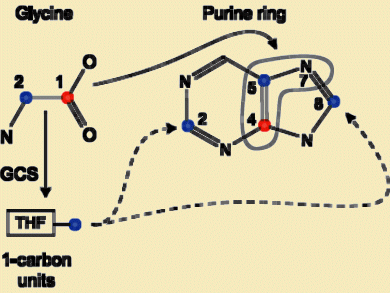The non-essential aminoacid glycine is synthetized by serine hydroxymethyltransferase. Mohit Jain, Broad Institute Cambridge, USA, and colleagues have revealed an unanticipated role for this catalysis in cancer cells proliferation. The researchers discovered that tumor cells strongly consume glycine, therefore, exhibit an elevated mitochondrial biosynthesis of this aminoacid. The study demonstrated that glycine is used by cancer cells, at least in part, for de novo purine biosynthesis, thus to sustain their high proliferation rate.
By analyzing an early-stage breast cancer patients cohort, the authors identified a strong correlation between mortality rate and mitochondrial serine hydroxymethyltransferase expression levels.
Glycine might therefore represent not only a new biomarker in cancer diagnostic but also a novel target to attack tumors metabolism.
- Metabolite Profiling Identifies a Key Role for Glycine in Rapid Cancer Cell Proliferatio,
M. Jain, R. Nilsson, S. Sharma, N. Madhusudhan, T. Kitami, A.L. Souza, R. Kafri, M.W. Kirschner, C.B. Clish, V.K. Mootha
Science 2012, 336 (6084), 1040–1044.
DOI: 10.1126/science.1218595




